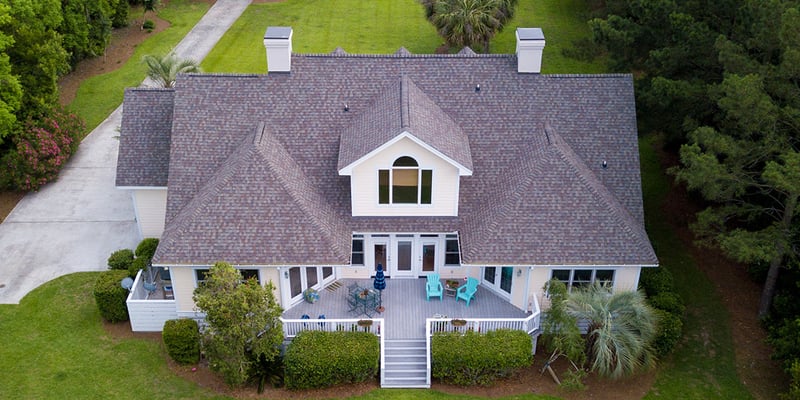- Home »
- Learningcenter »
- Atlanta roof code updates
2025 Atlanta Roof Code Updates Every Owner Must Know

Atlanta just broke temperature records in 2024, and the city council has decided to respond with new roof requirements that are going to save you money while they keep your home cooler. The new roof code updates now require light-colored materials for most buildings so they can cut down on heat absorption and lower energy costs. The great news is that the timing gives you a few months to get ready for these changes.
These changes come with real benefits like lower power bills plus more comfortable homes during those brutal summer months. But they also bring along some new problems like permit delays and higher costs at the start that have made a lot of homeowners and contractors worried. The requirements apply to almost every type of building out there and come with pretty strict performance standards that you'll need to meet - and these deadlines are coming up fast.
Your next roof project is going to cost more at the start. But you'll see energy savings as time goes on. Your summer bills can drop by hundreds of dollars once you have a roof that bounces heat back instead of one that absorbs it. If you plan ahead, you can get around those permit bottlenecks that could delay your project for weeks. These new standards are going to apply if you're just replacing a few damaged shingles or putting on a brand-new roof.
Let me explain what this new ordinance actually requires and when these requirements are going to kick in.
What the New Cool Roof Law Means for You
Atlanta's city council made a big call in June 2025 when they voted to make cool roofs the standard for most building types - this new law went into effect immediately and covers all new construction plus any roof replacements on commercial buildings, apartment buildings, and some residential homes. The requirements are already in place, with no grace period or time to get ready.
You might wonder why the council members went with cool roofs instead of other types of energy requirements - it's basically because these roofs have been proven to work. Cool roof materials are designed to bounce back more sunlight and absorb less heat than standard roofing materials - this brings down the temperature in the city while also helping property owners save money on their energy bills.
Cool roofs give you benefits in two ways. First, your monthly energy bills will go down during the summer months when air conditioning costs typically go through the roof. Second, the area around your building stays cooler, too - it helps with the heat island effect that tends to make city neighborhoods feel even hotter during warm weather.

The new law passed with plenty of support from council members and got the mayor's signature just two weeks after they voted on it. The city government doesn't typically move that fast. Now, whenever someone files for a permit for roof work, the city checks to make sure it meets these new standards. Data centers have to follow even stricter requirements because they use lots of energy and produce lots of heat.
These new requirements are more complete than anything we had on the books before 2025. Property owners now have to hit numbers for how much light their roof bounces back and how much heat it releases. These are technical measurements. But they're what the city uses to tell if your roof passes or not. These performance standards work the same way across the entire city - there are no exceptions for different neighborhoods or different types of properties.
If you're planning to replace your roof anytime soon, you'll need to use materials that meet the new requirements. The city planning department has put up the full text of the law on their website, along with all of the technical information you'll need to know.
The Performance Numbers Your Roof Must Hit
The Atlanta roof code gets into some pretty technical territory about heat reflection. You'll run into terms like solar reflectance and thermal emittance thrown around all of the time. These same terms show up in building codes all across the country. Don't let the decimal numbers scare you off, though.
Solar reflectance just works like sunscreen for your building. The higher the number, the more heat your roof bounces back instead of soaking it up. Commercial roofs need to hit at least 0.55 for their three-year aged solar reflectance. That means after three years of weather and wear, your roof still needs to bounce back more than half the sun's energy. Your cooling costs usually drop when your roof blocks more heat from going into the building. Building owners usually see lower utility bills within the first summer. Every degree your roof blocks out means less work for your HVAC system.
Thermal emittance is all about how well your roof gets rid of heat once it gets warm. You're looking at needing at least 0.75 here. Most commercial roofing materials hit this number pretty easily.

The code also gives you something called the Solar Reflectance Index or SRI - this takes the two numbers and combines them into one score that needs to reach 64 for most commercial buildings. A white TPO roof usually crushes these requirements, while dark asphalt shingles usually fall short. The material you choose makes all of the difference between meeting code requirements and dealing with expensive alternatives. Dark roofing materials need extra insulation to meet code. When you pick reflective materials from the start, you save on installation time and long-term energy costs.
Here's where people go wrong, though. Some materials look great when they're brand new. But their reflectance drops fast over time. You should be checking the three-year aged values. Manufacturer spec sheets don't always make this distinction obvious. The Cool Roof Rating Council and ASTM standards help check these claims.
If your roof can't meet these heat requirements, you can add more insulation to R-15 or higher instead. High-rise buildings with angled roofs usually get slightly more lenient requirements - this alternative costs more at the start but works when reflective roofing isn't an option for your situation. Property owners sometimes choose extra insulation anyway since it helps with energy bills throughout the entire year.
When You Can Skip the Permit Process
The new Atlanta roof codes have some built-in breaks for certain cases. If you own a single-family home or duplex, then you'll have an easier time when you need basic repairs.
You won't need a permit for non-structural re-roofing work as long as you keep it under three shingle layers total. The city also gives you a break for any roof repairs that cost less than $10,000. So homeowners can take care of moderate fixes without having to go through the paperwork - this exemption covers most of the usual maintenance work you'd need help with. Your usual shingle replacement is going to stay well under that $10,000 mark. You get to skip the permit process and go right to fixing your roof. Instead of waiting weeks, your project can be done in just a few days.
If you own property in a historic district, you'll have to follow stricter laws. You only get a break from permits for repairs under $2,500, and the work can't change how your building looks from the street. The city wants to keep these areas looking the same as they always have. So you have much less wiggle room before you need to start dealing with permits.

When you're doing big projects, you still have a few ways to prove compliance. You can go the standard way through Sections R401-R404, or you can pick other methods like Section R405 or R406. There's also REScheck software that gives you another way to show your project meets the energy requirements. Your contractor can pick whatever option works best for your particular project. Some projects fit better when you use performance calculations. But others are a bit simpler with the prescriptive laws.
You shouldn't confuse these exemptions with having free rein, though. Even work that doesn't need a permit still has to follow basic safety standards and local laws. Safety standards still apply if you need a permit or not. Your work has to meet building codes and proper installation standards. Bad workmanship causes legal problems that these permit exemptions won't protect you from.
What You Need to Plan Before You Start
The City of Atlanta has new online forms that are going to make your permit process much easier than it was before. You'll be able to download all of the updated checklists and then submit everything online, which means you won't have to wait in line downtown anymore. The good news is the online system actually works. These forms are going to show you every single requirement.
First, look at your budget because material costs just keep going up and up. The new energy standards mean you have to use certain types of shingles, and these are going to cost you more money right from the start. Material costs have been pretty crazy lately. Light-colored shingles, in particular, are taking much longer to arrive than they used to because of all of the supply chain problems we're seeing.

When you're planning your installation timeline, you need to add some extra time in there for weather delays. The unpredictable storms we get here in Atlanta can push your project back by a few weeks. Our Atlanta storms never match up with what the weather forecast says anyway. The new permit checklists are also going to need you to have full plans for how you'll manage debris, and you need these plans before you can even get started.
Since the 2025 updates went into effect, you're going to have to get annual inspections. Atlanta gets hit with bad weather more than we used to, so that's why the state is starting to require these. When the inspector comes out to your building, they're going to check your ventilation systems and the surface of your roof.
You should keep every single receipt and every inspection report together in one folder. If anyone has questions later on, these documents will prove that you followed all of the codes. They're also going to help you with tax benefits that are related to roof depreciation.
This year, the city has some new financial incentives if you do upgrades that meet all of the codes. These grants are designed to help make up for those higher material costs we talked about earlier. But here's the catch - you have to apply for them before you start any of the work.
No, you can't just slap some white paint on your old shingles and think that's going to meet the new energy requirements. There's an approved materials list that tells you the exact efficiency ratings you need for each type of product. Your contractor needs to make sure everything is approved before they go ahead and order any materials.
The Bigger Context and Impact
Atlanta wasn't the first to make this move. Cities like Los Angeles and New York already have these cool roof requirements in place, and you can see the results they've been getting. These cities have seen their energy use go down during peak summer months when everyone's running their air conditioner at full blast.
The timing is actually right for this change. Georgia adopted the 2015 International Energy Conservation Code, which lets cities tack on their own energy requirements on top of what the state already requires. Atlanta's new ordinance works within this framework, and everything lines up with what the state expects. You might be wondering if the starting costs will be worth it in the long run. The numbers show that cool roofs can cut your cooling bills by 10-15% during the hottest months of the year. That's when the power grid tends to get overloaded, and electricity rates rise the most. You'll see the difference when those summer bills come in.
Those savings add up over time. A common commercial building can save thousands of dollars per year just in cooling costs. Your monthly utility statement will show these changes within the first summer season after you install a cool roof.

Heat-related emergency room visits rise every summer. That's also the case in neighborhoods that have lots of concrete and not a lot of trees. The CDC tracks this data, and Atlanta's numbers look like what other hot cities are dealing with. Cool roofs won't fix all our heat problems. But they're one part of the answer.
Heat islands can put vulnerable residents in dangerous situations. Elderly people and those with chronic health conditions are at greatest risk when heat waves hit. Cool roofs help bring neighborhood temperatures down by a few degrees, which can definitely make a difference.
Starting this program won't be easy right from day one. Some contractors will need time to change their supply chains, and work crews will need training on how to install these new materials. But the city has been learning from other places that have already put similar programs in place.
Protect The Roof Over Your Head
Now is a great time to start planning these changes because if you wait until the last minute, then you'll be stressed out and paying more than you need to. You won't have time to shop around or make decisions. You should start calling contractors now and make sure that you find out about any rebates or incentives that might help you save money. It's also worth getting the paperwork you'll need to prove you followed the laws.
These rebates are going to run out at some point, and contractors get booked up months ahead of time. Your neighbors who start early are going to get better prices and the best installation times. The longer you wait, the fewer options you'll have and the more money you'll spend.
People in Atlanta have always found ways to manage the hot summers and crazy weather we get here, and here's one more chance to do something about it. You can see the difference it makes when you look at your utility bills every month. Say you've made these upgrades - your house will feel cooler in three years, not to mention how much you'll save on power bills.

At Colony Roofers, we work on business and home roofing, and we have offices in Georgia, Florida, and Texas. We know what works in the South because we've been doing this for a long time. We're here to help with expert advice and great repair and installation work. Call us now for a free inspection, and we'll take care of your roof right.
Your roof matters for how comfortable you are every single day in your home. Make sure that you check the city's website and other official sources to stay up to date as these changes come through.
 Call (678) 365-3138
Call (678) 365-3138



